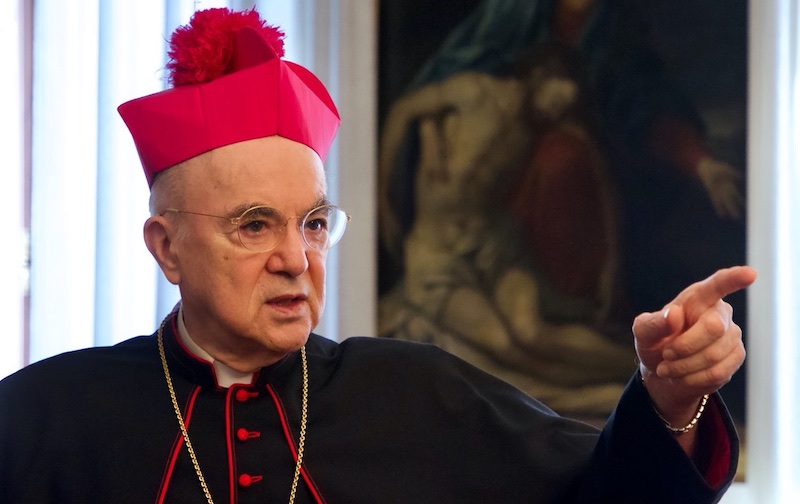by Archbishop Carlo Maria Viganò, LifeSite News:
 ‘I therefore wish to make it clear that I did not go to the Vatican yesterday, and that I have no intention of going to the Holy Office on June 28, and that I have not delivered any statement or document in my defense to the Dicastery, whose authority I do not recognize,’ Viganò wrote.
‘I therefore wish to make it clear that I did not go to the Vatican yesterday, and that I have no intention of going to the Holy Office on June 28, and that I have not delivered any statement or document in my defense to the Dicastery, whose authority I do not recognize,’ Viganò wrote.
(LifeSiteNews) — The reports spread by certain media outlets, stating that I presented myself yesterday, Thursday, June 20, at the Palace of the Holy Office, as intimated to me by the Decree of the Dicastery for the Doctrine of the Faith, is devoid of any foundation. These reports are completely false.
TRUTH LIVES on at https://sgtreport.tv/
The Jesuit magazine America, the media arm of the Society of Jesus in the United States and the megaphone of the “church of mercy” of the Jesuit Bergoglio, has rushed ahead, while Vatican News (here) was still totally unaware of the Decree sent to me on June 11, only by a simple email, without respecting those formalities necessary for the validity of the communication of a Decree, and which I myself published on X two hours before the meeting scheduled at the Dicastery. Although all the elements were clearly stated in my communiqué, inferences and speculations took precedence, in typical Jesuit style.
Haste is a bad counselor. Therefore, Gerard O’Connell’s article Archbishop Viganò charged with schism by the Vatican that appeared yesterday at America (here) seems to have been written even before I made the Vatican document public. This reveals the close contiguity between the Vatican apparatus and America magazine and confirms a very precise strategy, aimed at liquidating my trial with a condemnation that has already been decided by Bergoglio and his zealous collaborator Tucho Fernández, author of the scandalous pornographic pamphlet La Pasion mistica: Espiritualidad y Sensualidad, as well as Saname con tu boca: El arte de besar.
O’Connell writes:
The decree says that it considered ‘superfluous’ the prior investigation in accordance with Canon 1717 that states, ‘Whenever an ordinary has knowledge, which at least seems true, of a delict, he is carefully to inquire personally or through another suitable person about the facts, circumstances, and imputability, unless such an inquiry seems entirely superfluous.’ This means that the evidence against him had already been collected by the dicastery and did not require fuller investigation. Much of it was already in the public domain.
As can be seen, “evidence” is considered superfluous, and the procedure is deliberately simplified in order to reach a conviction as soon as possible:
America has learned that the decision to proceed with the extrajudicial penal trial would have been approved by the pope, since the accused is a bishop.
And that’s not all: the Jesuits of America are already giving indications about my procedural destiny:
The extrajudicial penal trial is in accordance with Canon 1364 of the Code of Canon Law, which states: ‘An apostate from the faith, a heretic or a schismatic incurs a latæ sententiæ excommunication, without prejudice to the provision of can. 194’ and that ‘he or she may also be punished with the penalties mentioned in can. 1336 §§ 2-4.’ This means, among other things, that the excommunication would be declared publicly, and it would remain in force until the convicted person repents. That same Canon 1364 also states: ‘If a long-standing contempt or the gravity of scandal calls for it, other penalties may be added, not excluding dismissal from the clerical state.’
The juridical competence of America magazine, however, seems to have no place in the Vatican, where it has now become common to use extrajudicial trials and the direct interventions of the Argentine both to cover up the real culprits and to hastily condemn the innocent. Beyond the media hype, the former Cardinal McCarrick – who in a serious trial would have been made to compensate the victims of his crimes after the examination of testimonies that could have clarified many connivances – continued to work for Bergoglio in the United States and China, where the secret Sino-Vatican Agreement saw him directly involved. Marko Rupnik, S.J., thanks to the intervention of his protector, had his excommunication lifted. He was not even dismissed from the clerical state; on the contrary, he was welcomed and incardinated in a diocese in Slovenia. Evidently, criticizing the Council is considered a far more serious crime than those of McCarrick and Rupnik.



